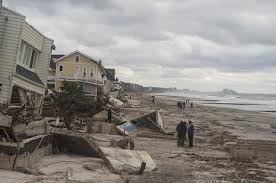We are experiencing climate-induced changes all around the world. Many people are awakened to this brutal reality in a very harsh way. And it comes in many different shapes.
Drought destroys farmer’s possibility to grow any crops or raise cattle. Barge-owners cannot sail the rivers (i.e. Mississippi) Wildfires burn down properties and business. Storms and high tides destroy shorelines. People, especially in developing countries, lose their lives and relatives etc.
Regardless if you accept climate-change or not, regardless what political colour you are, regardless ethnicity and regardless if you are rich or poor – it is happening!
As this hits us, one issue being more and more discussed is how insurance companies and countries are going to act on damages due to climate related events.
Are insurance-premiums going to sky-rocket?
Just recently hurricane Sandy destroyed a lot of properties on the east coast of the US. Should a rebuild be financed via government catastrophe-relief funds?
The risk that it will happen again is rapidly increasing. Often are properties with a sea view higher valued than a similar inland property, but should it also include continuous government-financed value insurance? Are taxpayers going to vote OK on that?
Once is an accident, two times is one to many.
Can and will zoning and planning be revised retroactive to fit the new reality or is it going to be heavily opposed by those who already have permits, with claims for economic compensation?
And what about all the lives that are lost, all the suffering and tragedies, can our society morally support rebuilds etc. knowing that it will put people’s health and wellbeing at increasing risk?
It is becoming clear that sustainability issues are going to play a much bigger role in future valuations and will affect the real-estate prices and market to a very high extent.
And this is not only about sea view and lowland. Who wants to own a country cottage distant from public transportation when fuel-prices increase rapidly or a summer-house in another country? Are people going to re-evaluate location of an office if it means that they can reduce car-use? Will short travelling distances between all kinds of service be valued?
Of course this will happen, or more correctly; this is happening already.


Building certification schemes like BREEAM and LEED are already valuing distance to service and transportation. This has given more and more real-estate owners the incentive to re-structure their portfolios – cutting down on the risk exposure.
Is anybody, even the richest, interested in being the last owner of a property on the beach?
The problem is that we – the people – by nature always react slowly to change. Each and every one of us believe that we are a bit smarter than everybody else and that we know, by instinct, how to maximize the profit – I’ll just keep it a little bit longer…..
This sounds a bit familiar – how big can you blow a bubble…..